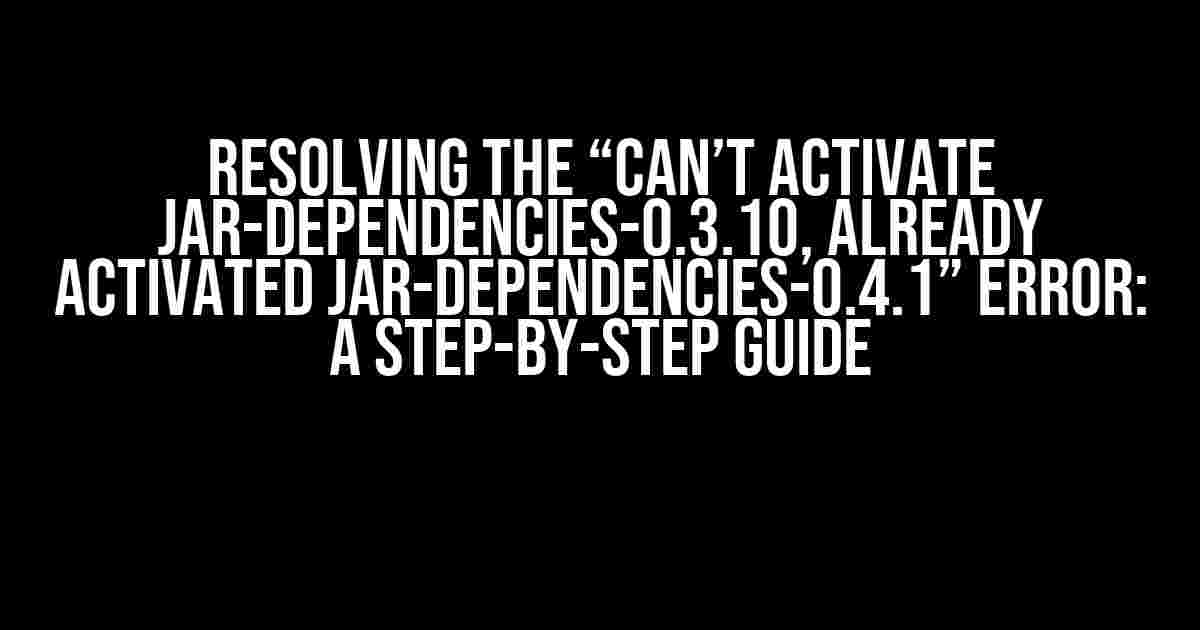If you’re reading this, chances are you’re struggling with a frustrating error message that’s halting your development progress. Don’t worry; we’ve got you covered. In this article, we’ll delve into the “Can’t activate jar-dependencies-0.3.10, already activated jar-dependencies-0.4.1” error, exploring its causes, symptoms, and most importantly, its solutions.
What is the “Can’t activate jar-dependencies-0.3.10, already activated jar-dependencies-0.4.1” Error?
The error message in question is typically encountered when working with Ruby on Rails projects, specifically when trying to install or update dependencies using the Bundler gem. It’s a conflict error that arises when two different versions of the jar-dependencies gem are attempting to coexist in your project.
Symptoms of the Error
- Installations or updates of dependencies fail
- The error message appears in the terminal or command prompt
- Project dependencies become outdated or inconsistent
- Frustration and hair-pulling ensue
Causes of the Error
There are a few reasons why this error might occur:
- Inconsistent Gemfile.lock: When your Gemfile.lock file contains conflicting versions of jar-dependencies, the error can arise. This often happens when you’ve updated your Gemfile but haven’t run
bundler updateto reconcile the changes. - Outdated Bundler Version: Using an older version of Bundler can lead to compatibility issues with jar-dependencies. Ensure you’re running the latest version of Bundler to avoid these problems.
- Dependency Conflicts: Other dependencies in your project might be relying on different versions of jar-dependencies, causing the conflict.
Resolving the Error: A Step-by-Step Guide
Now that we’ve covered the what, why, and how of the error, let’s dive into the solutions!
Step 1: Update Your Gemfile.lock
$ bundle update jar-dependencies
This command updates your Gemfile.lock to ensure it reflects the correct versions of jar-dependencies.
Step 2: Verify Your Bundler Version
$ bundle --version
Make sure you’re running the latest version of Bundler. If you’re not, update it using:
$ gem install bundler
Step 3: Remove Incompatible Dependencies
Identify the dependencies relying on different versions of jar-dependencies and remove them. You can do this by:
- Listing all dependencies using
bundler dependencies - Finding the dependencies causing the conflict
- Removing them by running
bundler remove [dependency_name]
Step 4: Re-run Bundler Update
$ bundle update
This command re-runs the Bundler update process, ensuring all dependencies are up-to-date and consistent.
Step 5: Verify the Resolution
$ bundle exec [your_command]
Run a command that previously triggered the error to verify the resolution. If the error persists, repeat the steps above or seek additional guidance from your development team or online resources.
Additional Tips and Tricks
To avoid encountering this error in the future:
- Regularly update your Gemfile.lock using
bundler update - Maintain a clean and organized Gemfile
- Use the
bundler dependenciescommand to monitor your dependencies - Collaborate with your team to ensure consistent dependency management
Conclusion
The “Can’t activate jar-dependencies-0.3.10, already activated jar-dependencies-0.4.1” error can be frustrating, but it’s not insurmountable. By following the steps outlined above, you should be able to resolve the conflict and get back to developing your project. Remember to maintain a clean and organized Gemfile, regularly update your dependencies, and collaborate with your team to avoid similar issues in the future.
| Tip | Description |
|---|---|
| Backup Your Gemfile.lock | Regularly backup your Gemfile.lock to ensure you can revert changes if needed. |
| Use a Gemfile Template | Use a Gemfile template to maintain consistency across projects and teams. |
| Monitor Your Dependencies | Regularly monitor your dependencies using bundler dependencies to catch conflicts early. |
With these tips and the step-by-step guide above, you’ll be well on your way to resolving the “Can’t activate jar-dependencies-0.3.10, already activated jar-dependencies-0.4.1” error and getting back to developing your project.
Frequently Asked Question
Stuck with the “Can’t activate jar-dependencies-0.3.10, already activated jar-dependencies-0.4.1” error? Don’t worry, we’ve got you covered! Here are some frequently asked questions and answers to help you troubleshoot and resolve the issue.
What is causing the “Can’t activate jar-dependencies-0.3.10, already activated jar-dependencies-0.4.1” error?
This error occurs when your project is trying to use two different versions of the jar-dependencies plugin. The version 0.3.10 is being requested, but the version 0.4.1 is already activated, causing a conflict.
How do I resolve the “Can’t activate jar-dependencies-0.3.10, already activated jar-dependencies-0.4.1” error?
To resolve this error, you need to resolve the version conflict. You can do this by updating your project’s dependencies to use a single version of the jar-dependencies plugin. Check your project’s pom.xml file and make sure that all dependencies are using the same version of the plugin.
Why is my project using two different versions of the jar-dependencies plugin?
This can happen when you have multiple dependencies in your project that require different versions of the jar-dependencies plugin. For example, one dependency might require version 0.3.10, while another dependency requires version 0.4.1. This can cause a version conflict, resulting in the error.
How do I check which dependencies are using different versions of the jar-dependencies plugin?
You can use the Maven dependency tree command to check which dependencies are using different versions of the jar-dependencies plugin. Run the command `mvn dependency:tree` in your terminal, and it will display a tree of dependencies, including the versions used by each dependency.
Can I exclude one of the versions of the jar-dependencies plugin to resolve the conflict?
Yes, you can exclude one of the versions of the jar-dependencies plugin to resolve the conflict. You can do this by adding an exclusion to the dependency that is using the conflicting version. For example, you can add the following code to your pom.xml file: `groupIdartifactId`. This will exclude the conflicting version of the plugin.
